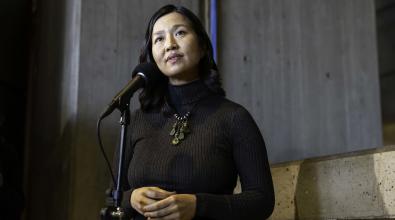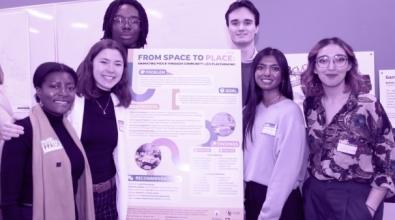 Read More
Read More
What Tulsa has to teach others about rebuilding trust in cities

Too often, local governments take a transactional view of resident engagement, with “public consultation” seen as just another hoop to jump through on the way kicking off or wrapping up a project. But an effort that’s taken root in Tulsa, Okla., offers city leaders everywhere a different model they can build upon—not only for deeper engagement around city priorities, but also for strengthening social cohesion and trust throughout the community.
Known as "Equity Dialogues," the program has trained 80 Tulsans to facilitate 90-minute community conversations around racial equity. The purpose is not to get community sign-off on any specific proposal. Rather, it’s to build connections across lines of difference and make communities stronger in the process.
The sessions are a product of Mayor G.T. Bynum’s longstanding efforts to reduce racial disparities in Tulsa. "These dialogues," Mayor Bynum explains, "offer our residents the ability to come together in small groups to create connections, show them how they can be part of citywide efforts to address disparities within our community, and build leadership capacity to facilitate constructive dialogues."
Here are four insights the work in Tulsa can offer other cities.
Resident engagement isn’t just for community 'input.'
In a time of low trust in government, city leaders are well positioned to experiment with new models of engaging residents and building social cohesion and trust. That’s because they’re so close to the people they serve. "Cities offer an opportunity to show what a multi-racial, multi-ethnic democracy can look like in the 21st Century," says Hollie Russon Gilman, co-author of a new civic engagement guide published by the Bloomberg Harvard City Leadership Initiative at the Bloomberg Center for Cities at Harvard University. Tulsa's Equity Dialogues, she says, is an example of innovations that "stretch our imagination of what’s possible."
As Chief Resilience Officer Krystal Reyes explains, Equity Dialogues are a powerful tool for making the city more resilient in the face of crisis. The sessions, she says, were helping to "normalize" difficult conversations about racial equity, long before COVID-19 and the murder of George Floyd upped the urgency nationwide.
"We have the ability to convene people, to be neutral, and to get the word out—that’s why we see equity dialogues as a role of government," Reyes says. "We can bring people together to have these conversations. Because it’s not just about the conversation, although the conversation is very important. Connection in itself is an outcome. And through those connections and conversations, solutions can come."
Activate residents to amplify impact.
Equity Dialogues uses a "train-the-trainer" model that enables the initiative’s reach to multiply beyond what City Hall can do on its own. Not only does the city reach more people by having residents themselves lead dialogues, but facilitators also have been hired by other public agencies and nonprofits to host similar racial-equity discussions at board meetings, planning sessions, and symposiums. These are also people who, by virtue of their training and civic engagement, also are well positioned to serve on local boards and commissions, Reyes adds.
"We’ve created a cadre of about 80 individuals who are trained and know about city government, the way it works, and why resilience and racial equity is part of that," she explains. "You need champions outside of government. When you've trained people like that, they're such a great asset who can be partners in your work. Treat that like gold."
The facilitators come from diverse backgrounds and include people who work in nonprofits, the Chamber of Commerce, a workforce development institution, and other organizations. Their training is based on a curriculum the city co-created with community engagement experts at the Oklahoma State University Center for Public Life; it offers a grounding in racial equity, unconscious bias, work the city is doing on equity, as well as practical tools for facilitating small groups.
Measuring what works is challenging but essential.
It can be difficult to prove the impact of a program like Equity Dialogues. While there's anecdotal evidence of friendships made and sustained through these conversations, it’s not easy to quantify the strength of citywide social connectedness and how it changes over time. However, Tulsa—recognized by What Works Cities Certification as one of the best at using data to deliver for residents—has more tools than most cities in this regard.
One of those tools is Tulsa Equality Indicators, a data-driven effort begun in 2017 to measure and track disparities among Tulsans over time. The data offer a high-level view of how the city is doing in its efforts to become more equitable, giving participants of Equity Dialogues conversations plenty to discuss and potentially advocate around. In addition, Reyes says indicators tracking representation on government boards as well as voter turnout are proxies for some of the aspects of social cohesion that Equity Dialogues are trying to build.
Reyes also notes that qualitative data from participants can shed light on what’s working and what needs improvement. While programs often focus on delivery when they reach the implementation phase, she points to ongoing community input as a critical component to improving the program. Feedback from first-year participants, for example, prompted the city to root the program with more formalized training, Reyes says.
It takes sustained investment and partnerships to unlock long-term gains.
With Equity Dialogues, Tulsa is making a long-term play of a kind you don't often see in local government; residents are often consulted about plans under development but it’s rare to see residents engaged in the implementation on an ongoing basis, Reyes says.
Doing that requires someone in city hall to champion the effort. To ensure that continues in a structured and supported way, the city recently moved the group Reyes manages—the Mayor’s Office of Resilience and Equity—into a new Department of City Experience that is charged with injecting a community focus into how the city invests in neighborhoods.
Building this community-based civic engagement infrastructure can also provide opportunities for partnerships in government, both advancing the work itself and helping stakeholders understand how they can use these resources to achieve their department’s goals. Reyes points to a partnership with the Economic Development Authority, which hired Equity Dialogues-trained facilitators to host conversations around economic development and racial equity, as an example of how the program can have positive impacts across government priorities.
This all helps sustain the funding and relationships necessary to maintain programming opportunities and expand the audience that is being reached. "One thing we talk about in my team is that community engagement takes resources," Reyes says. "Whether you’re finding a grant or allocating some budget, engaging communities is not without cost to do it right and in a meaningful and welcoming way."

